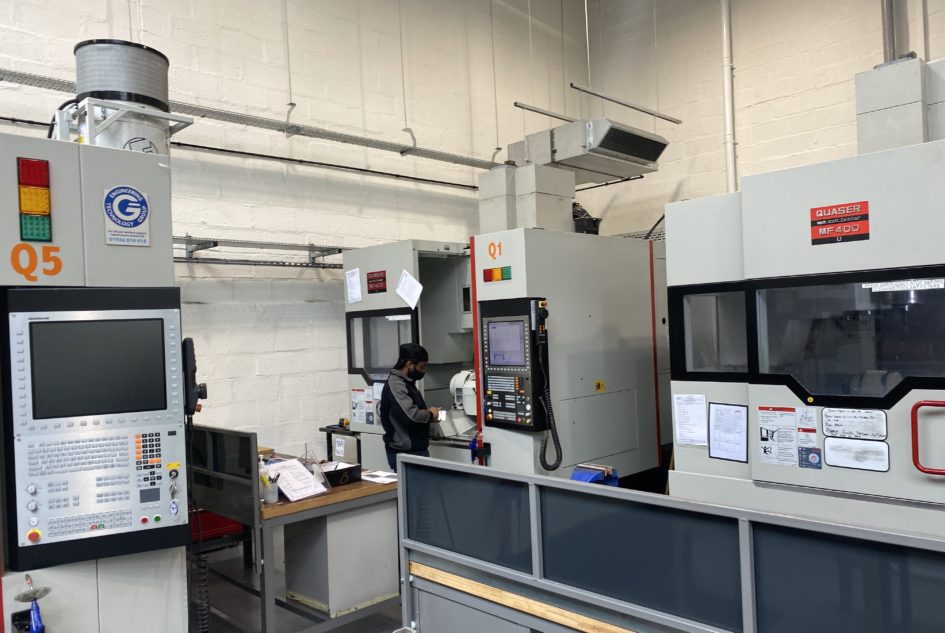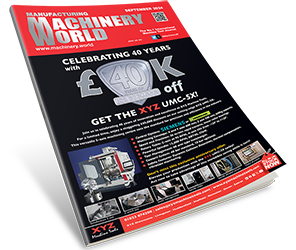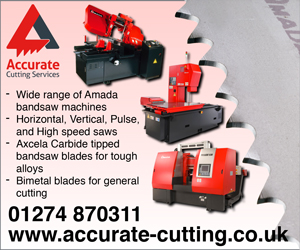The last 18 months of Covid induced business stagnation has been a challenging period for most manufacturers, but one thing it has taught us is that companies willing to invest will always weather the storm better than those that do not. One company that has not only weathered the storm but flourished is Milton Keynes subcontractor Goodman Precision Engineering Ltd (GPE).
The subcontract company has recently moved to a new facility that is 2.5 times larger than its previous site – and it has invested in an additional two Quaser machining centres from the Engineering Technology Group (ETG). Reflecting upon making the move and the new investments, company founder Mark Goodman says: “If we stayed at our previous facility, we would have had to replace machines, as we didn’t have any space for the new machines that we needed. I could see that it was potentially going to be a difficult time with Covid, but it was also a good time to move as there was a slight downturn because of Covid. This gave us the time and opportunity to move and also invest when we weren’t too busy.”
Looking at the latest additions that arrived at the tail end of 2020, GPE has acquired a Quaser MV214P and an MF400. The two new machines complement existing Quaser machines at GPE that include two Quaser MF400 machines that were installed in 2015 and 2017 as well as a Quaser MV184 that was installed in 2018. Identifying why GPE has specified Quaser machines, Mr Goodman says: “One of the main reasons I initially specified Quaser machines is because of the history I have with using Heidenhain controls on previous Bridgeport machines. The build quality, like the Bridgeport is very good and very robust, and we need this build quality as we do a lot of machining of stainless steel and titanium. We do more of this type of machining on the Quaser machines than any other machine tools because of their stability.”
Looking specifically at why GPE invested in the MF400 machine, Mr Goodman continues: “The Quaser MF400 is a simultaneous 5-axis machine that has an impressive work envelope and a good standard volume of cutting tool capacity. For the price point, this makes the machine a very good acquisition.” The MF400 incorporates a 320mm diameter trunnion table that can accommodate workpieces up to 400mm diameter by 300mm with its X, Y and Z-axis travel of 410 by 610 by 510mm. This BBT40 spindle taper machine incorporates a powerful spindle that demonstrates a high level of torque through the range up to a maximum of 20,000rpm.
Alongside the new MF400 is the new MV214P, acknowledging the reason for this purchase, Mr Goodman says: “This machine gives us a large capacity, so we can either do larger parts or set up several jobs simultaneously.” The machine has a 1.7m by 700mm bed with X, Y and Z-axis travel of 1524 by 700 by 610mm respectively with a maximum table load of 2000kg. As standard, the MV214P has a 40-tool carousel, but GPE opted for the 60-position variant – a solution that enables the company to avoid continually loading tools into the machine by standardising its tool positions. The Quaser MV214P can easily be retrofitted with a 4thaxis and the machine is fully prepared for automation with the company adding a tool probing system to the machine bed. The BBT40 taper also has through spindle coolant as well as the face and taper dual contact system for maximum rigidity and performance. This performance and precision are further enhanced by linear scales that feed into the Heidenhain CNC.
The company predominately machines components for the F1 industry and its recognised KERS technology, hybrid vehicle technology and other electronic motor parts. This sees GPE process a lot of insulating parts from materials such as plastics, aluminium alloys and steel. As a company that is making next-generation automotive and motorsport components and assemblies, GPE is certainly pushing ahead with its plans for future growth.
As Mr Goodman continues: “What this new factory does is gives us the facility to have more and different types of machinery and this will enable us to make different types of parts. The growth also helps us to further improve our professional set up. By having more space, we have room for component washing facilities and our inspection department is now double the size that it was previously. Additionally, the workshop is air-conditioned, so the machines are looked after better than before. With regards to equipment, our milling department is reasonably well sorted at the moment, but we may be looking to add turning capacity as well as other technologies like wire erosion. We have obviously been very pleased with the Quaser machines from ETG, and the technology and service support are very good.”






